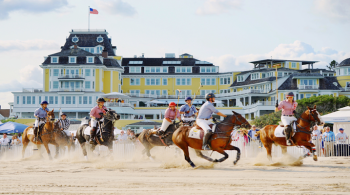From the Guest Editor, Myrna George
Many coastal communities decide - by action or inaction - what kind of experience is offered to residents and visitors.
Throughout much of our country�s coastline, we have illustrations of extreme examples, from the sprawling hodgepodge of anywhere USA with acres of parking lots surrounded by shopping centers and outlets and stores selling T-shirts, coolers, kites, and seashells labeled "Made in China" - to the still quiet charm of Rhode Island.
It has been said that when sprawl advances, charm retreats. Population growth is part of it. In 1902, when the pricey new automobile began taking the well-to-do to the beaches, the U.S. had 80 million people. Now, the same beaches must cope with a mobile population that�s pushing 300 million. As a result, visitors do avoid spending money in ugly places.
Coastal and countryside communities can choose how they respond to this mobile population. Ugly sprawl will happen unless we plan and zone, particularly for alternative modes of transportation - such as commuter rail and bike paths.
Charlestown, Coventry, East Greenwich, Exeter, Hopkinton, Narragansett, North Kingstown, Richmond, South Kingstown, West Greenwich and Westerly provide a unique sense of place. Those who visit us enjoy our simple pleasures - going to the beach, walking, renting a bike or kayak, looking for local art or food, or just sitting on the porch at the community gathering spot. Learning about the history of a place brings added charm and value.
If we value our moonlit walks on the beach and country strolls, we will guard against over-lit businesses and unshielded floodlights that block starlight with electric sky glow. After all, we are the stewards of this very special unique place that we call home.
As President of South County Tourism Council, I know that tourism that sustains or enhances the geographical character of a place � its environment, culture, aesthetics, heritage and the well-being of its residents - will become in future years the only sustainable economy.
Myrna George
President, South County Tourism Council








